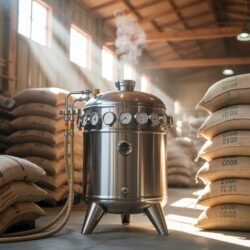Anaerobic fermentation has become a hallmark of specialty coffee innovation, allowing producers to craft unique flavor profiles and elevate their offerings in a competitive global market. While traditional coffee-producing powerhouses like Brazil and Vietnam dominate overall production, the movement toward anaerobic fermentation is being led by a select group of countries that are not only excelling in coffee quality but also embracing new processing techniques. Here are the top five coffee-growing countries at the forefront of the anaerobic fermentation movement.
1. Colombia
Colombia is widely recognized as a pioneer in anaerobic fermentation within the coffee industry. The country’s focus on specialty Arabica coffee and its culture of innovation have made it a global leader in experimental processing methods. Producers like La Palma y El Tucán and Los Pinos have gained international acclaim for their anaerobic and lactic fermentation projects, pushing the boundaries of flavor development and quality.
Impact:
Colombian anaerobic coffees are celebrated for their bright acidity, complex fruitiness, and wine-like characteristics. The country’s specialty coffee sector has embraced anaerobic fermentation as a tool for differentiation, with many farms developing proprietary protocols that set their coffees apart in competitions and auctions.
2. Ethiopia
As the birthplace of coffee, Ethiopia has a long tradition of coffee cultivation and a deep connection to the plant’s genetic diversity. In recent years, Ethiopian producers have begun experimenting with anaerobic fermentation, leveraging their unique heirloom varieties and terroir to create distinctive flavor profiles.
Impact:
Ethiopian anaerobic coffees often showcase floral, citrus, and berry notes, with an added layer of fermentation-derived complexity. The country’s specialty coffee sector is increasingly adopting anaerobic methods to highlight the natural vibrancy of its coffees and command higher prices in the global market.
3. Panama
Though not among the world’s largest coffee producers, Panama has earned a reputation for producing some of the most sought-after specialty coffees, thanks in part to its embrace of innovative processing techniques. Farms like Finca Deborah and Kotowa have been at the forefront of anaerobic fermentation, using controlled environments to unlock new flavor dimensions.
Impact:
Panamanian anaerobic coffees are known for their clarity, sweetness, and exotic fruit flavors. The country’s small-scale producers have made a name for themselves in international competitions and auctions, where anaerobic lots consistently fetch premium prices.
4. Costa Rica
Costa Rica has long been a leader in specialty coffee production, with a strong focus on quality and sustainability. In recent years, Costa Rican producers have adopted anaerobic fermentation as a way to enhance the natural sweetness and complexity of their coffees.
Impact:
Costa Rican anaerobic coffees are prized for their balanced acidity, tropical fruit notes, and clean cup profiles. The country’s progressive coffee sector continues to experiment with extended fermentation times and hybrid processing methods, further cementing its reputation as a hub for coffee innovation.
5. Brazil
As the world’s largest coffee producer, Brazil is not typically associated with experimental processing. However, a growing number of specialty coffee farms are now exploring anaerobic fermentation to differentiate their offerings and tap into the premium specialty market.
Impact:
Brazilian anaerobic coffees are gaining recognition for their chocolatey, nutty base with added layers of fruit and spice. While traditional Brazilian coffees are known for their consistency and volume, anaerobic fermentation is helping select producers stand out for their quality and creativity.
The Bigger Picture
While these five countries are leading the anaerobic fermentation movement, the technique is also gaining traction in other coffee-growing regions such as Honduras, Guatemala, and Indonesia. However, Colombia, Ethiopia, Panama, Costa Rica, and Brazil stand out for their commitment to quality, innovation, and the successful integration of anaerobic fermentation into their specialty coffee programs.
Anaerobic fermentation is more than just a trend—it’s a transformative approach that is reshaping the future of specialty coffee. By embracing this technique, these countries are not only elevating their own coffees but also inspiring the global industry to explore new possibilities in flavor and processing.


